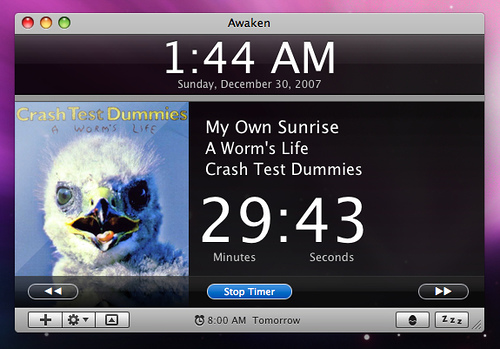Preface: These comments are mine and not those of my employer or anyone else. Ok, maybe they also represent the voices in my head.
Advertising on the Web
There's lots of advertising on the web. The biggest web company in the world (Google, ever heard of them?) generates pretty much all of their revenue from text (and now some image ads) based on the context of your web searches, email, or web page content. Big media sites like ESPN or ABC or NBC generate some revenue and awareness through the old late 90s staple of the banner ad. Blogs, podcasts, and video sites get in on the action with pre/post-roll ads, typical interstitials, and sponsors. Tons and tons of ways for sites to generate some income, but they're all pretty much based on getting a large number of eyeballs.
With the recent growth of blogs, forums, and just the general smaller sites run by individuals rather than corporations, folks have wanted to cash in on some of that free internet money. But banner ads and AdSense cash really don't work too well unless you gets loads of traffic. Now, granted, there's tons of ways to do that (which is why a bunch of the junk that fills up sites like Digg and Reddit these days are obvious linkbait bullshit attempts to generate lots of traffic), but the internet in general--through better algorithms and crowdsourcing and such--has gotten pretty good at weeding those things out. Besides, only a few linkbaiting attempts can work in a given time period, so even this is not a surefire way to get yourself that sack with a dollar sign on it.
Affiliate Marketing: Good
This gave way to a new niche: affiliate marketing. In all honesty, this started a while back with Amazon. And, to this day, Amazon's method isn't really bullshit. Amazon's affiliate system and basically a way for people who review stuff or talk about different things they want to link to those items on Amazon and get a kickback if someone purchases through their link. Everybody wins in this situation; the buyer gets an object they wanted, the site owner gets a few bucks back for setting up Amazon and the buyer, and Amazon gets to sell an object.
Plus Amazon gets some search engine love from having lots of sites link to them.
I've used the Amazon affiliate system when doing my not-very-often-update podcast. I've never made a dime, but that's because I don't do it very often and I'm not exactly linking to highly sought after stuff. But disclosure is important, because it's the lack of disclosure is a big reason that affiliate marketing is currently the <insert your horrific disease here> of the interweb.
Affiliate Marketing: Bad
Somewhere along the way, the affiliate stuff got bastardized. It was, of course, inevitable. We live in a world of pyramid and get rich quick schemes broadcast in half-hour increments on late night TV. But the internet's version is far more nefarious. The BS seemed to start in earnest with BzzAgent, a Boston-based marketing company that paid "agents" to go around talking up products--products that the agency had been paid to promote. There was no disclosure; "Hey, I've never actually tried this product! I'm getting PAID to tell you that I think it's awesome!" Of course, BzzAgent took some heat for their arguably deceptive marketing. It was not intentionally deceptive, but they were implicitly offering people incentives to be deceptive. After some bad press and some backlash, BzzAgent claims to be all about the disclosure.
Affiliate Marketing: Worse
Similarly, a company called PayPerPost sprung up. Here's a group that will pay you to write about a product, service, or other site, right on your own website! You write up a few paragraphs, throw in a few links, and you make some money. The sponsoring company gets some search engine juice and some good word of mouth. PayPerPost gets some money for bringing the two parties together.
Not so different from the Amazon model, right? Sure, except that there was no required disclosure that the post was, basically, just a paid advertisement. Posts from PayPerPost folks weren't required to be tagged as advertising, the way that those fake magazine articles are. The writer never even needed to try or use the product they were writing about. It was obvious to everyone what was going on: blatant link buying in an attempt to game the search engines.
(For a more complete story on PayPerPost, try TechCrunch.)
So what's the difference between this and the Amazon model? The end-user. The buyer. They're getting hosed in that they're just the commodity being traded in the middle. Taking someone to Amazon, where they're then exposed to any number of other reviews for the product in question (which, by the way, is almost always a consumer product that's a tangible good) is incredibly different than linking them to a web hosting company (more on that later) or some other digital good that is not quite as easily identified as something a user does or doesn't want.
Particularly when all of the reviews for said product are paid for, and thus biased, by the aforementioned affiliate system.
So BzzAgent and PayPerPost started paying people to write about products and services, without a requirement of disclosure, and in many cases, without actually even trying out the product they were promoting. Sure, they were just trading on their online identity--burn people enough and you're opinions are worthless. That is, of course, unless you can create endless domains and identities. The two companies were rightfully shat upon by the honest folks on the web. Both have started to talk about honest disclosure and transparency in attempt to stay relevant and to ensure their clients don't run away for fear of being painted with the same dishonest brush.
It hasn't worked for PayPerPost, whose business was rightfully crippled by Google when Google basically dropped the rank of any site found to be working with PayPerPost. If PayPerPost's business is as honest as they claim it is, this wouldn't have mattered. The paying companies would still be lining up to get reviews and links. They're not. They wanted search juice. And that's not for sale, well, not through PayPerPost, at least.
Affiliate Marketing: The Drizzling Shits
Which brings me to my biggest pet peeve, and the one that hits closest to home: bullshit web hosting review sites. There's tons of them. They claim to review web hosts. They don't. They rank sites based on who pays them the most money per hosting sign up. It's, quite frankly, a pox on the hosting industry. Each web host offers the affiliate a little more money. In return, the affiliate gives them good links for SEO, some traffic and new sign ups, and a couple of web STDs.
From some of our internal research, somewhere around 20% of all sign ups that come through affiliates are fraudulent. Most of them have a life span significantly shorter than a typical sign up. Many of the sign ups that make it through the front end fraud checks are still BS accounts. They sign up, collect the affiliate fee, and then cancel. With most web hosts, if you did that 10 times a day, you'd make in the neighborhood of $100k a year.
I'm not kidding.
Why is this so bad? Again, it comes down to disclosure. None of these sites reveal they're doing this for pay. Most of them layer some arbitrary, made up review score on top of their listings, depending on which host is paying the most that month. The affiliate doesn't care that it's slimy--they're getting paid. The web host doesn't care that it's slimy--they're getting new "real" hosting accounts. Who cares? The actual honest person who did hit Google or their search engine of choice to look for a web host to open a blog or a place to host their pictures of their grandkids. They find a review site, sign up with the top rated host ("oh my, this host is rated the top on ten different sites!"), and then find out it's a completely crappy host. The poor grandma doesn't realize that ten different review sites were all run by the same person/group/company. She didn't realize that the top host was paying these affiliates so much because their service is so bad they're hemorrhaging customers.
I'll admit, my company pays affiliates. Slimy ones, at that. We're not hemorrhaging customers. We've actually stepped up our game, I think, and have started to deliver a better hosting experience for most of our customers. But growing organically by word of mouth isn't good enough for us, so we put on the full body web condom and deal with the underbelly of the internet.
It's disgusting and immoral and we shouldn't do it. Many of us have made that case. But, unfortunately, the dollars trump us. So we build in workarounds and special rules to pay off certain affiliates to make sure they get the conversions they want so they'll keep sending us traffic. And keep linking to us.
Affiliate marketing isn't inherently bad. But, as with anything, when you mix it with the internet, it ends up being more bad than good. It's the drizzling shits of the internet.
Soon enough, Google will step up and kill this trend. And it'll be a great day when we can focus on stuff that matters and not spend thousands of man-hours building search algorithms to weed out fake sites, building fraud detection to weed out the fake sign ups, and trying to convince ourselves that just because other folks are doing it, we need to do it to keep up.
Yuck.
Save Us Obi-wan
Dear Matt Cutts,
Can Google please fix the fake review sites? It would be awesome.
Thanks.
Your pal,
The Interweb
Affiliate marketing is everywhere now. Google it. You'll find hundreds of blogs devoted to how to get a spammy, content-less site ranked high in the search results, get people to click your links to generate conversions, and how to basically make money being dishonest. Granted, all marketing is somewhat dishonest--promote the good stuff, hide the bad stuff. But when it's a first party doing it, you know to take what they say with a grain of salt (which is why good companies are transparent and talk about their occasional foibles ... it makes the marketing spin look less spinny). When a supposed neutral third party is hiding the fact that they're making money off of their "review," it's not easy to discern that. It's ugly and stupid and dishonest. And it makes people loads of money.
Again, it's why affiliate marketing is the drizzling shits.
Examples
Just in case you're wondering, here's what a bullshit review site looks like. I shouldn't claim this to be authoritative. I don't know with 100% certainty that these are fake review sites. But they fit the mold. They cloak their affiliate links, bring you over to the web host with an affiliate cookie, and have surprisingly similar reviews. I won't link to them, but you can paste them into your address bar.
http://www.best-webhosting2007.com/
http://www.web-hosting-review.toptenreviews.com/
http://www.web-hosting-reviews.org/
http://www.web-hosting-top.com/
http://www.webhostingtoplist.com/
http://www.webhostingfever.com/
http://www.websitehostingreviews.com/
http://www.100best-free-web-space.com/







